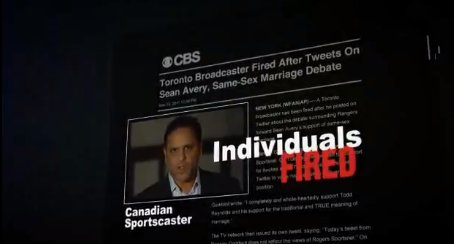
A slate of Minnesota law professors and state politicians have signed on to a letter titled, “Freedom to Marry, Freedom to Dissent,” which criticizes the flap over Mozilla CEO Brendan Eich, his resignation, and the outcry over his donations to an anti-LGBT organization.
The letter, signed by 58 marriage equality supporters and posted to Real Clear Politics, reads in part:
“[W]e are concerned that recent events, including the resignation of the CEO of Mozilla under pressure because of an anti-same-sex- marriage donation he made in 2008, signal an eagerness by some supporters of same-sex marriage to punish rather than to criticize or to persuade those who disagree. We reject that deeply illiberal impulse, which is both wrong in principle and poor as politics.
—
As a viewpoint, opposition to gay marriage is not a punishable offense. It can be expressed hatefully, but it can also be expressed respectfully. We strongly believe that opposition to same-sex marriage is wrong, but the consequence of holding a wrong opinion should not be the loss of a job. Inflicting such consequences on others is sadly ironic in light of our movement’s hard-won victory over a social order in which LGBT people were fired, harassed, and socially marginalized for holding unorthodox opinions.”
Minnesotans are generally over-represented as signatories. Six faculty members of the University of Minnesota Law School have signed on: Brian Bix, Dale Carpenter, Heidi Kitrosser, Brett McDonnell, William McGeveran, and Richard Painter. And two Minnesota politicians have also signed on: Sen. Branden Petersen, R-Andover, and Rep. Joe Radinovich, DFL-Crosby.
The letter has been praised and panned by the left and right.
PJ Tatler, an opponent of marriage equality, writes, that it might be a nice sentiment but its unrealistic. “It’s fine to acknowledge that Americans retain the right to defend an institution that goes back thousands of years and comes from a power far higher than Washington, but the authors of the letter never once acknowledge the fact that same-sex marriage’s recent progress is not owed as much to persuasion, but to coercive court decisions, intimidation and media bullying. Those court decisions go against votes held in states as diverse as Texas, North Carolina and California. Whenever Americans have had the chance to vote on whether to preserve the definition of marriage or to change it, they have voted to preserve it.”
Zack Ford, who covers LGBT issues at Think Progress, writes that the pledge gives cover to anti-LGBT activism. “This “Freedom to Dissent” pledge essentially justifies anti-gay advocacy… Those supporting this “Freedom to Dissent” pledge are promising to tolerate intolerance, which is exactly what opponents of LGBT equality are demanding. It’s unclear how defending those who wish for LGBT people to remain second-class citizens constitutes “the only truly secure path to equal rights,” as the pledge claims.”
John Becker, writing for the Huffington Post, notes that the pressure on Mozilla CEO Brendan Eich wasn’t actually from LGBT organizations:
A coalition of 58 LGBT people and allies — most of them conservatives or libertarians — came out with a statement yesterday on the resignation of former Mozilla CEO Brendan Eich. Mr. Eich, you’ll recall, voluntarily stepped down earlier this month amidst public outcry over donations he made to the viciously homophobic Proposition 8 campaign and various anti-gay politicians.
The statement, titled “Freedom to Marry, Freedom to Dissent,” desperately tries to revive the lie that Eich was targeted and toppled by LGBT activists — a victim of “left-liberal” “intolerance,” as Andrew Sullivan so ridiculously claimed.
Conor Friedersdorf at the Atlantic, calls it “A Manifesto for the Liberal Wing of the Gay-Equality Movement,” even though most signatories label themselves moderate or conservative.
Readers who’ve followed my recent series of posts on this subject know that I align with the 58 signatories. Beyond the substantive arguments they make, their effort is noteworthy insofar as it refutes the subset of conservatives who’ve caricatured the whole gay-rights movement as illiberal in the wake of the Eich resignation, as well as the subset of progressive gay-rights supporters who misleadingly write as if gays and their allies largely agree that punishing of gay-marriage opponents is desirable. In fact, opinion on this subject is extraordinarily diverse, and it wouldn’t surprise me if the statement above reflects the values of a majority of gay-marriage proponents as well as a majority of gays.